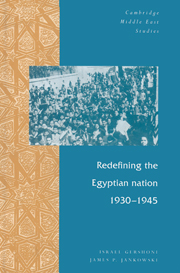Book contents
- Frontmatter
- Contents
- Illustrations
- Preface
- Acknowledgments
- List of abbreviations
- 1 The roots of supra-Egyptian nationalism in modern Egypt
- Part I The intellectual formulation and social dissemination of new supra-Egyptian orientations and ideologies
- Part II Supra-Egyptianism in Egyptian politics
- 7 Egypt, Arab alliance, and Islamic Caliphate, 1930–1939
- 8 Palestine, public opinion, and Egyptian policy, 1936–1939
- 9 The road to the Arab League, 1939–1945
- 10 Conclusion: from Egyptian territorial to supra-Egyptian nationalism
- Notes
- Select bibliography
- Index
9 - The road to the Arab League, 1939–1945
Published online by Cambridge University Press: 24 November 2009
- Frontmatter
- Contents
- Illustrations
- Preface
- Acknowledgments
- List of abbreviations
- 1 The roots of supra-Egyptian nationalism in modern Egypt
- Part I The intellectual formulation and social dissemination of new supra-Egyptian orientations and ideologies
- Part II Supra-Egyptianism in Egyptian politics
- 7 Egypt, Arab alliance, and Islamic Caliphate, 1930–1939
- 8 Palestine, public opinion, and Egyptian policy, 1936–1939
- 9 The road to the Arab League, 1939–1945
- 10 Conclusion: from Egyptian territorial to supra-Egyptian nationalism
- Notes
- Select bibliography
- Index
Summary
Due primarily to the circumstances of war, little in the way of extending Egypt's links with its Arab and Muslim neighbors was achieved during the early years of the war. Significant movement in the direction of greater Egyptian regional involvement only occurred from 1942 onwards, as war receded from the Middle East. Early in 1943, the Wafdist ministry of Mustafa al-Nahhas initiated prolonged diplomatic consultations with other Arab governments concerning the establishment of a new association of independent Arab states. As a result of further negotiations conducted by the non-Wafdist ministries of Ahmad Mahir and Mahmud Fahmi al-Nuqrashi in 1944–5, the League of Arab States was established in March 1945. Egypt was the unquestioned leader in the involved inter-Arab diplomatic negotiations resulting in the formation of the Arab League. Negotiations commenced with an Egyptian initiative in the spring of 1943; Egypt to a large degree controlled the course of negotiations over the next two years; the character of the new international organization was in good measure determined by Egypt, corresponding with Egyptian conceptions of what Arab “unity” should mean in the postwar world; and Egyptian primacy within the body was symbolized by the selection both of Cairo as its headquarters and an Egyptian, ‘Abd al-Rahman ‘Azzam, as its first Secretary-General.
Egyptian regional policy from 1939 to 1941
The outbreak of war in September 1939 had immediate repercussions for Egyptian political life.
- Type
- Chapter
- Information
- Redefining the Egyptian Nation, 1930–1945 , pp. 192 - 211Publisher: Cambridge University PressPrint publication year: 1995



